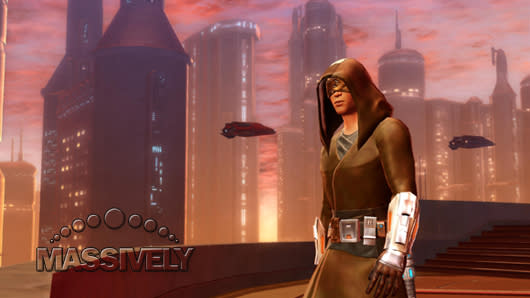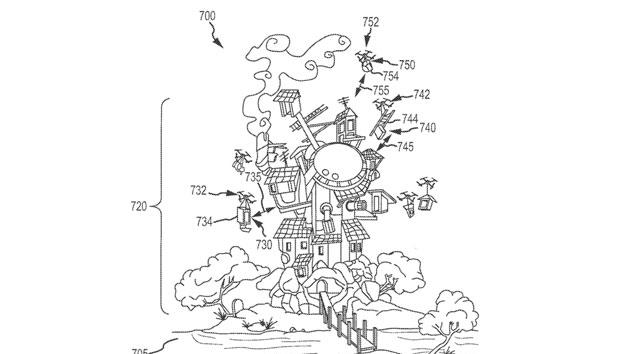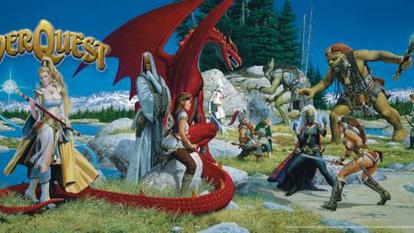themepark
Latest

Disney World starts accepting Apple Pay and Google Wallet this week
Making a trip to Walt Disney World during the holidays? You might not avoid the long queues or endless parking lots, but you won't always have to pull out your wallet. As promised back in September, the Orlando area theme park will start accepting mobile payments on December 24th. The launch will let you use Apple Pay, Google Wallet and tap-to-pay credit cards to buy tickets, shop at stores and order from both bars and fast service restaurants. There are a few gaps. The system doesn't yet work at places that need a portable payment terminal, so you'll still have to break out the cash or plastic at a table service restaurant. You'll also have to wait until 2015 to get similar treatment at Disneyland in California. But hey, it's a start -- and it may save you a few headaches the next time you're jonesing to take a ride at Space Mountain. [Image credit: Kent Philips]

Raph Koster explains how WoW changed MMOs
There's liable to be a lot of virtual ink spilled over World of Warcraft as it celebrates its 10-year anniversary this month. You can save yourself some time by just reading famed MMO designer Raph Koster's lengthy and informed analysis, though. He covers a ton of ground, both negative and positive, including WoW's roots in EverQuest and the DikuMUD while also touching on all of the genre features that Blizzard cut in the name of "fun" and accessibility. Among the things left by the wayside were features that were proven. Gone were the richer pet systems that had driven so much engagement from players in earlier games. Player housing, past and future source of endless devotion (and revenue) in other games, absent. Never mind stuff like towns and politics and the like. Crafting took massive steps backwards from the heights it had been developed into in [Star Wars] Galaxies or even Sims Online, and went back to being more like that in EverQuest. Even the robust character customization that we slaved over in Galaxies, a system which today is in every RPG on earth, was gone. Koster credits WoW as the true innovator of the quest-led game, but he also points out that the game stifled MMORPG innovation in numerous ways.

The Soapbox: In praise of SWTOR's 12X experience
It's taken 12 times the normal XP rate, but Star Wars: The Old Republic is finally my main MMO (at least for another week or so). Well, OK, it's also taken a series of spectacularly ill-considered decisions by XLGAMES and Trion, but that's a rant for another day. I've been playing SWTOR quite a lot over the past month since BioWare's subscriber-only pre-expansion boost has cut all of the godawful grindpark garbage right out of a galaxy far, far away. Too bad it's just a temporary fix, though -- here's hoping that the devs give veterans the option of keeping the XP bonus long after December 1st.

The Daily Grind: Would you play an all-endgame MMO?
I'm hard on MMOs with endgames, especially endgames that focus on a single repetitive activity. The problem isn't so much what that activity is but that MMOs spend so much time making you do something else before you can get to that activity -- instead of just letting you just do that presumably ideal and fun activity from the start. That's prompted some clever players to wonder, why not just make an all-endgame -- an all-raiding -- MMO? To be clear, I'm not talking about sandboxes or persistent PvP games that can be perceived as entirely endgame. I'm talking about a classic themepark experience with the levels and questing ripped out -- just endgame dungeons and raids, pure PvE group challenge, from the moment you log in to the moment you log out. If raiding really is about the challenge and the thrill of big group PvE, such a game would be welcomed by hardcore raiders... right? And more importantly: Would you play it? Every morning, the Massively bloggers probe the minds of their readers with deep, thought-provoking questions about that most serious of topics: massively online gaming. We crave your opinions, so grab your caffeinated beverage of choice and chime in on today's Daily Grind!

Disney's drone research eyes better parades and floating screens
We've seen drones used for all sorts of things from film production to package delivery. Now, it seems Disney may be looking to leverage the aerial vehicles for its theme parks. The company has applied for three patents that employ the remote-controlled gadgets for floating projection displays and airborne marionettes. That latter option is meant to boost hovering parade characters that have been limited to gas-filled balloons with little mobility, while the former uses UAVs to float a screen over park visitors. The third scenario is one where the individual drones each carry a lighting rig to achieve the desired effect. Something like fireflies after dark, we'd surmise. All three projects would be commanded from a "ground control station" to coordinate flight paths. Of course, with this being an application, there's no guarantee that you'll encounter the compact flying vehicles at Disneyland anytime soon, but the outfit's R&D department has a knack for coming up with awesome ideas.

Working As Intended: The unfortunate conflation of sandboxes and PvP
A certain perplexing belief about sandboxes pervades the blog comments, forums, and general chats of MMOs: All MMO sandboxes are free-for-all PvP games. If it doesn't have free-for-all PvP, it's by definition not a sandbox because sandboxes let the players make all the rules and decisions. Free-for-all PvP adds the necessary spice to keep you on your toes and keep a game fresh. Without it, you may as well be playing The Sims. All of these statements are wrong.

Tamriel Infinium: About that Elder Scrolls VR grind
Last time around I took a little flak from people who felt that my positive opinion of Elder Scrolls Online would change once I reached a certain veteran rank. In the past two weeks, I've gotten most of the way to VR2 whilst playing primarily solo a couple of hours per day. I would've gotten higher, but I got sidetracked into ESO's addictive crafting minigame! Anyway, so far my opinion of the world's first Elder Scrolls MMO hasn't changed despite the fact that the VR content does seem pretty grindy. The game is still a first-class themepark that's full of content, incredible art direction, and interesting progression, and the cherry on top of this particular sundae is one of my favorite IPs. All that said, ZeniMax could stand to alter its post-50 approach.

The Daily Grind: What's the ideal level cap for an MMO?
Massively commenters recently debated whether a game without levels is the same as a game without a leveling cap thanks to Black Desert's proposed character advancement system, an increasingly common lateral advancement system that allows players to build their characters more sideways than up. But outside of such sandboxes, most themepark games stake their mechanics on levels, for good or bad. And that got me thinking about the ideal level cap for an MMO. Even if two games require roughly the same amount of time to cap, a bigger number can seem so much more intimidating. Asheron's Call's 150 levels and Anarchy Online's 205 320 always seemed unreachable to me, and wasn't it cute back when World of Warcraft expected but 60 levels out of you? What do you think -- what's the ideal level cap for an MMO with levels? Every morning, the Massively bloggers probe the minds of their readers with deep, thought-provoking questions about that most serious of topics: massively online gaming. We crave your opinions, so grab your caffeinated beverage of choice and chime in on today's Daily Grind!

Watch what happens when you pair an Oculus Rift rollercoaster with the real thing
It's hard to imagine getting bored on a roller coaster, but a pair of English gents figured out a way to make riding the rails even more thrilling: adding VR to the mix. The duo took a publicly available model of an undisclosed UK theme park's coaster, and imported it into the Unity game development suite. From there, the two smuggled a laptop, mouse, power supply, camera and an Oculus RIft past park security. After getting into the car and outside the unblinking gaze of the ride's cameras, out came the VR headset. The idea of the experiment was to test real-life physical feedback synced with a virtual experience, sans a fancy home-built setup. Of course, the concept of riding a roller coaster while experiencing a virtual recreation of said coaster seems redundant, but the team's ambitions go a bit beyond that surface idea.

EverQuest turns 15 years old on March 16
"While everyone was worrying about the world ending with Y2K in 1999," says SOE's latest press release, we were "creating a new world that forever changed the MMO and gaming industry with the introduction of EverQuest." Whether that change was good or bad is certainly debatable, but no one can deny the long-running fantasy themepark's massive influence. March 16th is EQ's 15th birthday, and SOE has released a video and an infographic to celebrate. Click past the cut to check them both out.

Working As Intended: Endgame is the worst thing that ever happened to MMOs
Endgame is the worst thing that ever happened to MMOs. I tweeted this last year, and it won't stop rattling around in my head. Every time a developer dodges concerns and leaps to his version of the "elder game," every time a reader claims a reviewer who doesn't get to endgame is irrelevant, and every time someone justifies a weak game mechanic because it doesn't matter at max level anyway, it rattles around some more. Endgame is the worst thing that ever happened to MMOs. Having an endgame, thinking you need one, and designing your game around it -- this is the core problem of the MMO genre. No matter how hard you spin it, when you create a game with an endgame, you create a game with an end... and not much else.

Defining sandparks within the MMORPG space
One of the most common subjects of debate and conversation on Massively focuses on sub-genres. While I think we can all agree on what the letters in "MMORPG" superficially mean, things become a little muddier when we talk about the different types of MMOs and what falls where on the MMO spectrum. There are MMORTS titles, MMOs that offer city-building and massive strategy, and MMOFPS titles, shooters that host thousands of players, for example. We even talk about MMO-like games, or games that are multiplayer but not massively concurrently multiplayer, like MOBAs. And what about games that toe the line between sandbox and themepark, games that offer a bit of sand in their parks or linear questing in their virtual, open worlds? Themeboxes? Sandparks? Let's talk about what makes these MMO mutts so important and so fun to play. I'll list some examples of games that could fit the hybrid definition, but feel free to chime in with more.

Pathfinder's Dancey on the 'broken AAA themepark financial model'
GoblinWorks CEO Ryan Dancey gave a presentation earlier today at GamesBeat 2013 focused around Pathfinder Online's approach to solving the "two fundamental problems of MMO development." These problems are the "broken AAA themepark financial model" and the customer desire for a game that "persistently reflects the cumulative effects of their actions." The sandbox paradigm is the solution to both problems, Dancey explained, as is a community-driven initiative that GoblinWorks calls crowdforging. Crowdforging revolves around feature implementation that is heavily influenced by the game's community. Pathfinder "maximizes meaningful human interaction, and a minimum viable product allows us to build our game with a small, agile team," he explains, before citing a few of the project's Kickstarter numbers. Dancey also shows off in-game footage from the game's most recent milestone. Finally, Dancey says that Pathfinder monetization will begin following an alpha in early 2014. The monetization will take the form of an early enrollment system akin to Gmail's beta. "We're on schedule, on budget, and ready to change forever how MMOs are made," Dancey concludes. We've embedded a lengthy GamesBeat video stream after the break. The Pathfinder presentation starts around the 03:23:00 mark. [Thanks Chris!]

EVE Evolved: Will Star Citizen or Elite harm EVE?
Publishers haven't been willing to put a lot of money behind a sci-fi sandbox for some time, but upcoming games Star Citizen and Elite: Dangerous seem set to revive the genre thanks to the power of crowdfunding. Star Citizen in particular has collected a world record $19.6 million in pledges so far from almost 258,000 individuals, eliminating the need for publishers and heavy investment entirely. Though both games are designed to be a primarily singleplayer or small-scale multiplayer adventures, their respective developers have already promised shared online universes and sandbox gameplay that could give EVE Online a run for its money. The past decade has shown EVE to be one of the most resilient MMOs on the planet. It's survived several major scandals, barely noticed the release of giant World of Warcraft, and has somehow maintained its subscription-based business model in a market rapidly being overtaken by free-to-play titles. Even at its lowest point, the game managed to survive the 2011 monoclegate scandal and the subsequent fallout that saw CCP Games lose 20% of its staff worldwide. EVE's subscriptions and concurrent user numbers have historically been unaffected by the release of new MMOs or sci-fi titles, so why should Star Citizen be any different? In this week's EVE Evolved, I look at how EVE Online has lived with very little direct competition until now and ask whether Star Citizen and Elite could be among the first games to directly draw players from EVE.

Tamriel Infinium: Audience expectations, Elder Scrolls Online, and EverQuest Next
Last week was a huge week for MMO fans. We were expecting some cool news from Sony Online Entertainment about EverQuest Next from SOE Live. Despite not being a huge EQ follower, I was enormously interested in what SOE (one of my personal favorite game developers and publishers) planned on doing with its staple franchise. Then Bethesda announced that for the first time ever the ZeniMax team would show in-game footage of the Elder Scrolls Online on Twitch TV. Specifically, players wanted to see the first-person view not seen at previous conventions. ZeniMax delivered, and the crowd went wild. I believe both presentations were wonderful, and I would be lying if I said that both presentations didn't pique my interest. I would also be lying if I said that I had no concerns about how each of the games will be received. I talked about it with my guild, Nefarious Intent. We have some hardcore Elder Scrolls fans and some MMOers who have been playing EQ games since the '90s. During the course of the debate, we came to the conclusion that the audience of each game expects something completely different and that pitting these two titles together is completely unfair. So of course that's why I have to do just that in today's column. Why are there different expectations between ESO and EQN? How is it going to be completely possible for both games to be highly successful?

Some Assembly Required: Want a real living story? Try a sandbox!
I'm going to criticize Guild Wars 2 this week, or more accurately, ArenaNet. I know, I know. I might as well change the name of this column to How to Alienate Friends, Co-workers, and Commenters. As a qualifier, I don't play Guild Wars 2. I have in the past, briefly, but my criticisms today are mostly directed at ANet's marketing folks or whoever is responsible for the Living Story refrain that gets sillier and sillier every time I hear it.

Some Assembly Required: On MMOs and loss aversion
I've been reading a book called Scorecasting lately. It's basically an academic exercise in statistics and human behavioral analysis as it relates to the decisions made in both individual and team sports. One of the chapters touches on a theory called loss aversion, which is a psychological phenomenon first attributed to Daniel Kahneman and Amos Tversky. The theory is generally understood to mean that humans fear potential losses much more than they enjoy actual gains, and thus they often act in statistically irrational fashion to avoid said losses. We can also see principles of loss aversion at work in MMOs. In fact, I'd go so far as to posit that loss aversion is a large, if indirect, reason why many people play MMOs in the first place. It's also a major reason why sandboxes, virtual worlds, and games that feature some sort of tangible risk/reward mechanic have been in such dire straits since MMOs went mainstream. Follow me past the cut and see if you agree.

GDC Online 2012: CCP on keeping players cheaply
Sandboxes get a lot of flak in today's themepark-dominated MMO industry. That said, sandbox developers who do it right will be laughing all the way to bank, according to CCP senior designer Matthew Woodward. Woodward recently gave a talk at GDC Online titled The Other White Meat: Design Architecture for Sandbox Games. The presentation focused on the three pillars used by the firm to power its long-running EVE Online MMORPG. Woodward stressed social aspects, goals and goal-driven players, and most importantly, emergent gameplay. "The big win is that emergence is cheap. A lot of emergent gameplay discussion is about the One Big Moment. In EVE, the big heist that happened six years ago, in Ultima Online, the assassination of Lord British," Woodward explained. "If you do this well, people will play your game forever. People will pay for it forever." Massively sent two plucky game journalists -- Beau Hindman and Karen Bryan -- to Austin, Texas, for this year's GDC Online, where they'll be reporting back on MMO trends, community theory, old favorites, and new classics. Stay tuned for even more highlights from the show!

Some Assembly Required: The newer-is-better fallacy
There's this idea that old-school MMO players don't know what they want. I've an inkling that the folks espousing this idea have little experience with the old-school games they purport to be evolving beyond. This doesn't stop them from claiming that old-schoolers are in love with a time period instead of a game, though, which in turn intimates that old-schoolers' minds are too muddled to know exactly what they do and do not prefer. Regardless of how you feel about old vs. new, sandbox vs. themepark, or world vs. game, it's easy to see that conflating someone's personal preference with nostalgia results in a perspective that's of limited usefulness at best.

The Daily Grind: Should MMOs embrace item decay?
If you grew up on themeparks like World of Warcraft, the very idea of item decay is probably foreign to you. Just go to the vendor and click the repair button and everything's just as it was the day you looted it, right? Well, no. In older games and especially in sandboxes, you'd need a player to repair your gear, and sometimes not even that would help. Sometimes the gear was irreparable, meaning that once it ran out of juice, it was gone forever. Decaying items are really not all that different from items with charges that deplete (consider Guild Wars 2's and Glitch's crafting tools), but modern gamers freak out at the idea that they might lose their gear to wear, and I don't blame them since many themeparks turn gear acquisition into a huge grind. But even sandboxes like Ultima Online have hedged their original item decay systems, allowing players to repair many artifacts indefinitely. It might take a fundamental change in game design, but what do you think -- should MMOs bring back item decay? Every morning, the Massively bloggers probe the minds of their readers with deep, thought-provoking questions about that most serious of topics: massively online gaming. We crave your opinions, so grab your caffeinated beverage of choice and chime in on today's Daily Grind!







